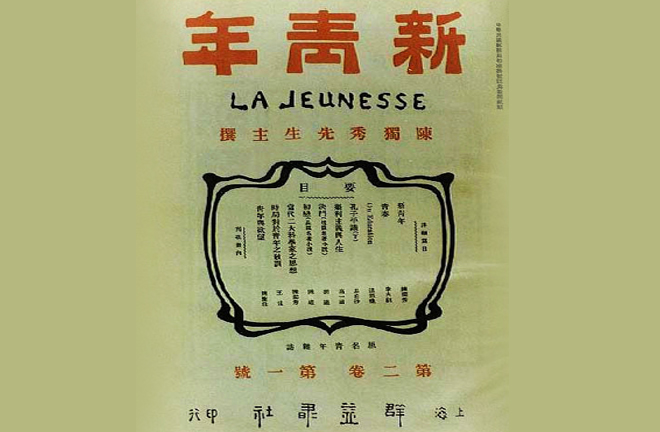Looking back on a century of Chinese women’s literature

La Jeunesse (New Youth) was a Chinese magazine in the 1910s and 1920s that played an important role in initiating the New Culture Movement and spreading the influence of the May Fourth Movement. Photo: FILE
CHANGSHA—At the recent 14th China Women’s Literature Symposium in Changsha, Hunan Province, more than 100 experts and scholars exchanged ideas on the modern evolution of Chinese women’s literature, the reinterpretation of contemporary Chinese literature and classic literary texts from a gender perspective, and literature and gender in the context of media integration.
Modern Chinese women’s literature began with the May Fourth Movement in 1919, said Luo Ting, a professor at Hunan Women’s College. The movement greatly strengthened the larger New Culture Movement for cultural and sociopolitical reform at that time. Before and after the movement, the first batch of modern intellectual women appeared in China, who advanced women’s literature in the country. Since then, numerous modern female writers have emerged and shined in the world with their unique artistic strengths, including Eileen Chang, Lu Yin, Shi Pingmei, Ding Ling, Bing Xin, Xiao Hong, Su Qing and Lin Huiyin.
Looking at articles on women’s issues in La Jeunesse (New Youth), a radical monthly magazine published in Beijing in the 1910s and 1920s, Liu Huiying, a research fellow at the National Museum of Modern Chinese Literature, analyzed the pioneering position and important influence of this magazine in advocating women’s liberation.
Liu Zhao, a professor at Changchun Normal University, analyzed the women’s newspapers and periodicals that appeared around the May Fourth Movement. Around the late Qing and early Republican era (late 19th century and early 20th century), women’s newspapers and periodicals provided a historical opportunity for the female community to exchange ideas and conduct literary creation in the public domain, which cultivated modern women writers in the context of new learning, mainly from the West.
Lu Zhuoning, a professor from the College of Liberal Arts at Guangxi University for Nationalities, said that the cross-domain presence of outstanding women writers in the history of modern Chinese literature reveals not only women’s participation in the modern transformation of Chinese traditional culture, but also modern Chinese women’s pursuit of self-worth in light of the collision of Chinese and Western cultures.
Chen Fumin, a research fellow from the Institute of Literature at the Chinese Academy of Social Sciences, said that the issue of women is essentially a question of modernity. Fighting for women’s rights is an important part of China’s modern revolution. The awakening of women’s consciousness about their rights is in line with the modernization process of Chinese society.
This year marks the 100th anniversary of the May Fourth Movement and the 70th anniversary of the founding of the People’s Republic of China. At the same time, the reform and opening up has continued through more than four decades.
Qiao Yigang, a professor from the School of Literature at Nankai University, said that many new phenomena and topics closely related to gender have emerged in the context of the new era. Researchers in women’s literature should have an interdisciplinary perspective and mindset.
The rapid development of new media technology has exerted a significant impact on how contemporary women’s literature is composed and appreciated.
Zhao Shuqin, a professor from the College of Liberal Arts at Hunan Normal University, said that the elements of Japanese manga and anime adopted by post-80s women writers have enhanced the popularity of their fiction, making it more amenable to market demand and the tastes of young audiences.
Lyu Ruohan, a professor from the College of Chinese Language and Literature at Fujian Normal University, said that vibrant new media and online cultures have provided a new creative space for women’s essays. The interdisciplinarity and pluralism of women’s essay discourse has become a cultural and literary phenomenon in the 21st century worthy of further exploration.
Zhu Yuying, a professor at the Department of Chinese Literature and Media at Bozhou University, reexamined the relationship between humanity and nature through the eco-literature of such contemporary women writers as Chi Zijian, Ye Guangqin, Jiang Zidan and Zhang Kangkang. Zhu said that contemporary women writers have introduced an ecological vision and established new aesthetic values, adding an ecological dimension to women’s literature in the new century.
While gender research has made great progress in recent years, some studies have to a certain extent deviated from China’s actual national conditions, neglected Chinese history and culture, and imposed Western feminist theory, Qiao argued. This has introduced a lot of confusion into China’s gender research. As such, it has become an important task for gender research to refer to the national conditions and to be problem-oriented with realistic concerns.
edited by JIANG HONG

 PRINT
PRINT CLOSE
CLOSE